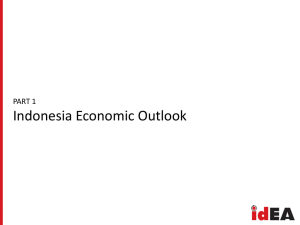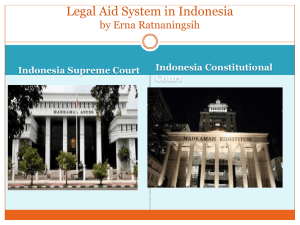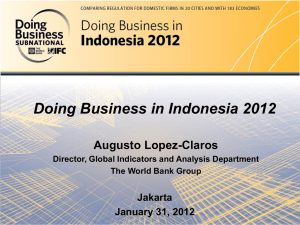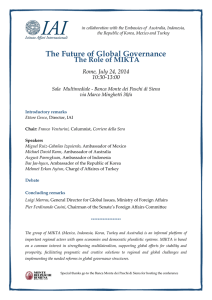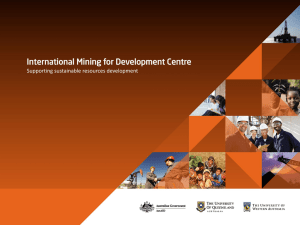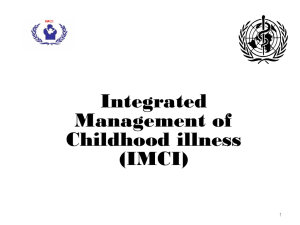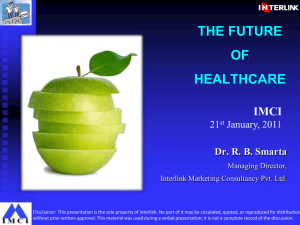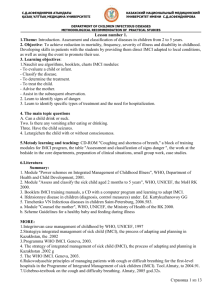Household and health facility surveys in Indonesia
advertisement
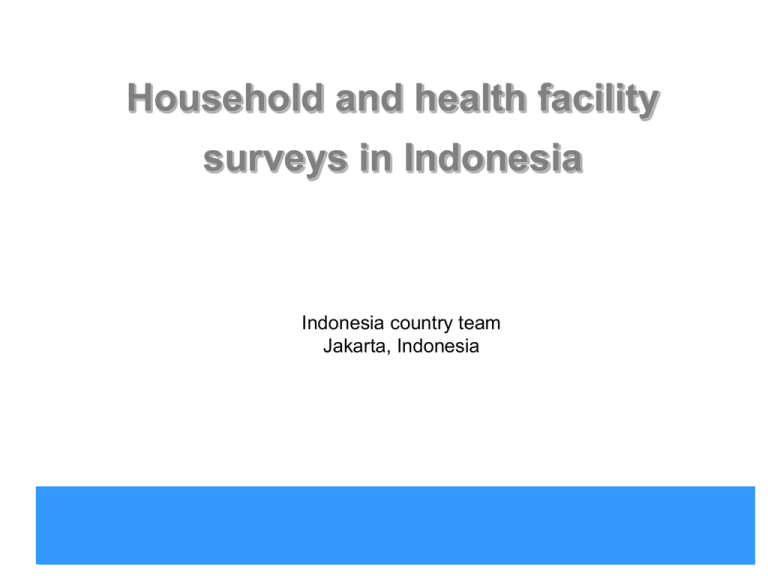
Household and health facility surveys in Indonesia Indonesia country team Jakarta, Indonesia Indonesia country office MNCH-Household Survey • Builds on CDD/ARI household surveys • Provides information of direct programmatic relevance on the coverage of key interventions for maternal, newborn, and child health • Identifies problems with intervention delivery and/or reasons for delivery failure that should be addressed by programme managers • (Provides information on adolescent sexual and reproductive health) • Provides some information on expenditures for child health Indonesia country office MNCH-HHS: Characteristics (1) • Sub-national, focus on outputs and outcomes (no impact) • Coverage measures and information on: - delivery channels (how and where interventions are delivered) and/or - reasons for coverage failures • Limited to few interventions with high potential for impact • Modular format for adaptation based on interventions with high potential for impact that are actually being scaled up locally Indonesia country office MNCH-HHS: Characteristics (2) • Program focus: locally planned and analyzed, results rapidly fed back into programming cycle • Developed jointly by WHO/CAH and WHO/MPS with input from UNICEF and from countries where the survey has been tested • Complementary to and consistent with existing household survey tools (DHS, MICS) • Limited cost and short duration Indonesia country office Sampling methodology and sample size • Cluster sampling • Using a sampling strategy where all individuals have the same probability of being selected and where the size of the population in each village/community is taken into account • Usual sample between 1000 to 1,200 households (larger sample are difficult to manage and are likely to require more than 2 weeks of data collection) • Maximum of 120 clusters • Between 10 to 15 households selected in each cluster • In each household, children <2 or <5years of age are the entry points Indonesia country office Process in Indonesia • Introduced in workshop June 2010 • Adapted by University of Indonesia • Use by UNICEF as baseline for intervention project • Use by SCF and MCHIP in project areas • Intention to be socialized to district health offices for their surveys on intervention coverage Indonesia country office STUDY LOCATION 4470 km 13/04/2015 6th Asia-Pacific Conference of Reproductive and Sexual Health Rights Indonesia country office QUESTIONNAIRES MODULES 13/04/2015 Module HH Household Module AN Antenatal Care Module DN Delivery and Newborn Module BN Breastfeeding & Nutrition Module IM Immunization Module MA Prevention of Malaria Module CO Fever and Cough Module DI Diarrhea Module VA Vitamin A Module HF Health Facility 6th Asia-Pacific Conference of Reproductive and Sexual Health Rights Indonesia country office Ownership of MCH Book among mothers in 4 districts 13/04/2015 6th Asia-Pacific Conference of Reproductive and Sexual Health Rights Indonesia country office BREASTFEEDING (n= 799) In all districts, exclusive breastfeeding were low and there was significant advice on using formula milk 13/04/2015 6th Asia-Pacific Conference of Reproductive and Sexual Health Rights Indonesia country office Evaluation Survey of IMCI Implementation in 8 Districts in Indonesia Center for Health Research University of Indonesia Indonesia country office Objectives • The objectives of this study were to determine: – Current level of quality of care delivered to sick children at outpatient health facilities – Current quality of counseling given at outpatient health facilities and caretakers’ understanding of home treatment of sick children – Current availability of key health system supports that are required for the implementation of sick children services, such as drugs and vaccines, equipments and supervision – Principal barriers to effective integrated case management of sick children Indonesia country office Study area Indonesia country office Methods • Design: – Cross sectional survey of 15 puskesmas/district • Population: – Sick children who come to puskemas in the six districts • Sample size – Using sample size formula for estimation of a population proportion – Proportion of sick children who are appropriately managed using IMCI = 50%, error of estimation=15%, confidence level= 95%, design effect=2 – Minimal sample size: 86 sick children/district Indonesia country office Proportion of sick children managed by IMCI trained providers Indonesia country office Checking of signs, symptoms and immunization status by IMCI trained & untrained providers Note: all heath providers in Rote Ndao are not trained in IMCI Source: IMCI Evaluation Survey in 8 Districts in Indonesia, 2008. Indonesia country office Proportion of sick children who did not need antibiotic/antimalaria but received those drugs Note: all heath providers in Rote Ndao are not trained in IMCI Source: IMCI Evaluation Survey in 8 Districts in Indonesia, 2008. Indonesia country office Health facility received at least 1 supervisory visit that include observation of case management during the previous 6 months Indonesia country office Conclusions Health Facility Survey • Assessment of sick children by IMCI trained providers was more comprehensive than by untrained providers • Nevertheless, about half of sick children who were assessed by IMCI trained providers were not comprehensively assessed according to IMCI standard procedure • Missed opportunities for immunization occurred in all sick children who were managed by IMCI trained & untrained providers • The use of antibiotics & antimalarials was more rational in IMCI trained providers compared to untrained providers Indonesia country office Summary • Health facility surveys allow the assessment of the effectiveness of IMCI training • Household surveys allow to determine coverage and effectiveness of interventions at the household level • WHO generic tools can be easily adapted fro use in countries • Both surveys can be used by programme planners to determine next steps, or for operations research Indonesia country office


